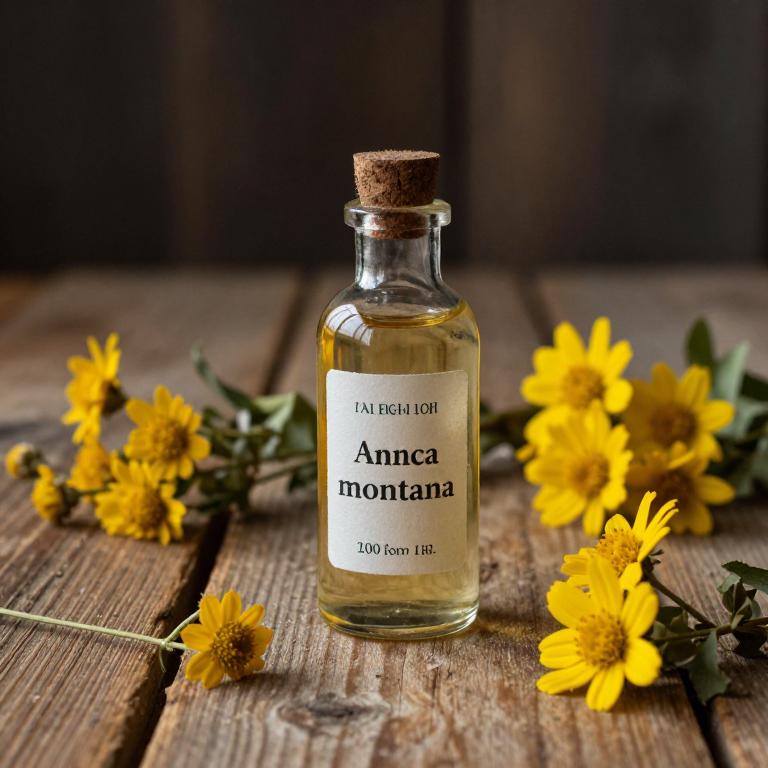10 Best Herbal Syrups For Leg Pain

Herbal syrups for leg pain are natural remedies that combine plant-based ingredients to alleviate discomfort and promote circulation in the legs.
These syrups often contain herbs such as ginger, turmeric, and willow bark, which are known for their anti-inflammatory and pain-relieving properties. They are typically used to address conditions like restless legs syndrome, varicose veins, or minor muscular aches. Many people prefer herbal syrups due to their perceived safety and fewer side effects compared to pharmaceutical painkillers.
However, it is important to consult with a healthcare provider before use, especially for individuals with existing medical conditions or those taking other medications.
Table of Contents
- 1. Ginger (Zingiber officinale)
- 2. St. john's wort (Hypericum perforatum)
- 3. Salvia (Salvia officinalis)
- 4. Stinging nettle (Urtica dioica)
- 5. Yarrow (Achillea millefolium)
- 6. Field horsetail (Equisetum arvense)
- 7. Mountain arnica (Arnica montana)
- 8. Blessed thistle (Cnicus benedictus)
- 9. Common grape (Vitis vinifera)
- 10. Black pepper (Piper nigrum)
1. Ginger (Zingiber officinale)

Zingiber officinale, commonly known as ginger, has been traditionally used for its anti-inflammatory and pain-relieving properties.
Herbal syrups made from ginger are often recommended for alleviating leg pain caused by conditions such as arthritis, varicose veins, or muscle strain. These syrups work by promoting circulation, reducing inflammation, and easing discomfort through the bioactive compounds like gingerols and shogaols. When consumed regularly, they may provide a natural alternative to conventional pain medications.
However, it is important to consult a healthcare professional before using ginger syrup, especially for individuals with diabetes or those taking blood-thinning medications.
2. St. john's wort (Hypericum perforatum)

Hypericum perforatum, commonly known as St. John's Wort, is traditionally used in herbal medicine for its potential anti-inflammatory and analgesic properties.
While it is well-known for its effects on mood disorders, some studies suggest that its active compounds, such as hyperforin and hypericin, may help reduce pain and inflammation in conditions like arthritis or muscle-related leg pain. Herbal syrups containing Hypericum perforatum are often preferred for their ease of absorption and mild taste, making them a popular choice for individuals seeking natural remedies. However, it is important to note that St. John's Wort can interact with various medications, so consultation with a healthcare provider is recommended before use.
Despite its traditional use, more clinical research is needed to fully understand its efficacy and safety for treating leg pain.
3. Salvia (Salvia officinalis)

Salvia officinalis, commonly known as sage, has been traditionally used for its medicinal properties, and its herbal syrup has gained attention for its potential benefits in alleviating leg pain.
The syrup is believed to possess anti-inflammatory and analgesic properties that may help reduce discomfort associated with conditions such as arthritis or muscle strain. While scientific research on its effectiveness for leg pain is limited, some studies suggest that the compounds in sage, such as rosmarinic acid, may contribute to pain relief and improved circulation. Many individuals use sage syrup as a natural remedy, often combining it with other herbal treatments for a holistic approach to managing leg discomfort.
However, it is important to consult a healthcare professional before using sage syrup, especially if you have underlying health conditions or are taking other medications.
4. Stinging nettle (Urtica dioica)

Urtica dioica, commonly known as nettle, has been traditionally used in herbal medicine for its anti-inflammatory and pain-relieving properties.
When prepared as a syrup, Urtica dioica can provide a soothing effect on the legs, particularly for conditions like arthritis or muscle soreness. The syrup is often made by harvesting fresh or dried nettle leaves and simmering them with honey or another natural sweetener to preserve the plant's beneficial compounds. Its use for leg pain is supported by its high content of vitamins, minerals, and antioxidants that may help reduce swelling and improve circulation.
However, it is important to consult with a healthcare professional before using nettle syrup, especially if you have allergies or are taking other medications.
5. Yarrow (Achillea millefolium)

Achillea millefolium, commonly known as yarrow, has been traditionally used in herbal medicine for its anti-inflammatory and circulatory benefits.
When prepared as a herbal syrup, it may help alleviate leg pain by improving blood flow and reducing swelling in the lower extremities. The syrup is often made by combining dried yarrow flowers with honey or sugar and water, creating a soothing and nourishing tonic. Some studies suggest that yarrow contains compounds that may support vascular health and reduce inflammation, making it a potential natural remedy for conditions like varicose veins or restless leg syndrome.
However, it is important to consult a healthcare professional before using yarrow syrup, especially for individuals with existing health conditions or those taking medications.
6. Field horsetail (Equisetum arvense)

Equisetum arvense, commonly known as field horsetail, has been traditionally used in herbal medicine for its purported benefits in alleviating leg pain.
Herbal syrups made from Equisetum arvense are believed to support joint health and reduce inflammation due to the presence of silica and other bioactive compounds. These syrups may be particularly beneficial for individuals suffering from conditions such as arthritis or muscle soreness in the legs. However, it is important to consult with a healthcare professional before using these syrups, as they may interact with certain medications or have side effects.
Despite its historical use, scientific evidence supporting its efficacy for leg pain remains limited, and more research is needed to confirm its therapeutic benefits.
7. Mountain arnica (Arnica montana)

Arnica montana herbal syrups are commonly used to alleviate leg pain caused by inflammation, bruising, or muscle strain.
These syrups work by promoting circulation and reducing swelling through their anti-inflammatory and analgesic properties. They are often recommended for conditions such as varicose veins, muscle soreness, and post-injury recovery. However, it is important to consult a healthcare professional before use, especially for individuals with allergies or those taking other medications.
While generally considered safe when used as directed, arnica montana should not be applied to open wounds or ingested in excessive amounts.
8. Blessed thistle (Cnicus benedictus)

Cnicus benedictus, also known as blessed thorn, has been traditionally used in herbal medicine for its potential to alleviate leg pain, particularly associated with conditions like varicose veins and poor circulation.
Herbal syrups made from Cnicus benedictus are believed to improve blood flow and reduce inflammation, offering a natural alternative to conventional treatments. These syrups are often prepared by combining the dried leaves and flowers of the plant with honey or other sweeteners to create a palatable formulation. While some studies suggest possible benefits, more clinical research is needed to fully understand its efficacy and safety.
As with any herbal remedy, it is advisable to consult a healthcare professional before use, especially for individuals with underlying health conditions or those taking other medications.
9. Common grape (Vitis vinifera)

Vitis vinifera, commonly known as the grapevine, has been traditionally used in herbal medicine for its potential health benefits, including relief from leg pain.
Herbal syrups made from Vitis vinifera are believed to contain compounds like resveratrol, which may help reduce inflammation and improve circulation. These syrups are often used as a natural alternative to conventional pain relievers, particularly for conditions like varicose veins or chronic leg discomfort. While some studies suggest that grape-based remedies may support vascular health, more clinical research is needed to confirm their effectiveness for leg pain.
As with any herbal supplement, it is advisable to consult a healthcare professional before use, especially for individuals with existing medical conditions or those taking other medications.
10. Black pepper (Piper nigrum)

Piper nigrum, commonly known as black pepper, has been traditionally used in herbal medicine for its potential therapeutic properties.
When incorporated into herbal syrups, black pepper may help improve circulation, which can be beneficial for individuals experiencing leg pain. The active compound in black pepper, piperine, is believed to enhance the absorption of other nutrients and may have anti-inflammatory effects. Some people use piper nigrum herbal syrups as a complementary remedy to alleviate discomfort associated with poor circulation or minor muscular aches in the legs.
However, it is important to consult a healthcare professional before using such syrups, especially if you have underlying health conditions or are taking other medications.